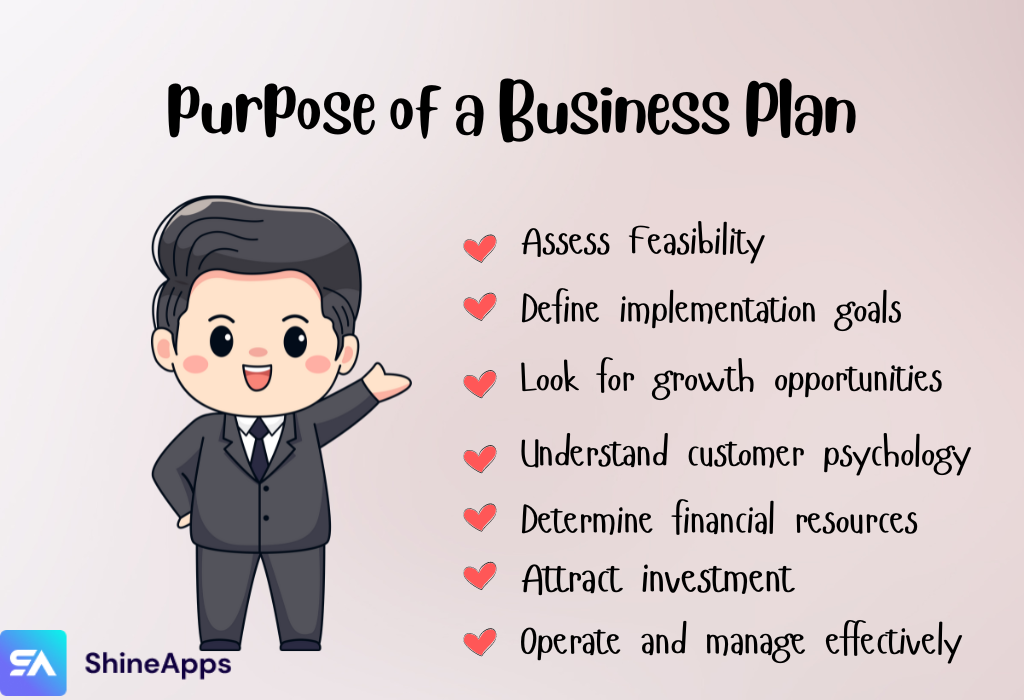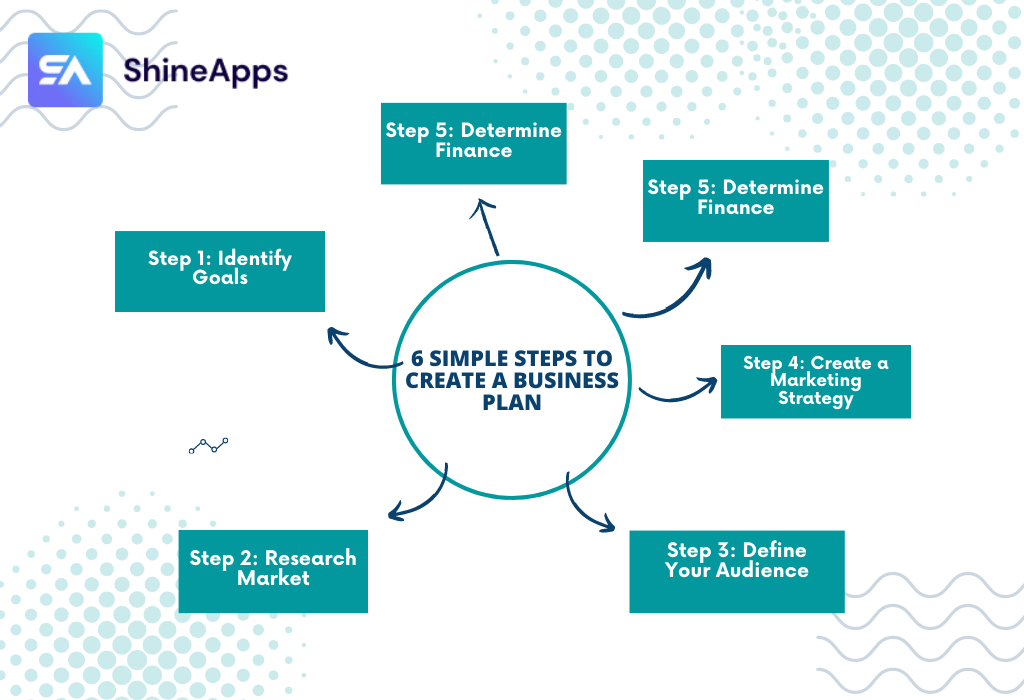We can compare business to a journey, and a business plan is the road map to successfully lead us to the destination. A perfect business plan will take your business to the next level. So, what is a business plan? Why is it Important? And how do you build a perfect business plan? Let’s find out here!
What is a Business Plan?

A business plan is simply a detailed outline of an enterprise’s business plan, drawing a full picture of opportunities and challenges, helping businesses define clear goals and stay on track.
In a business plan, you’ll learn about your business, your target customers, the products or services you offer, and how you’ll go to market. It also includes competitor analysis, marketing and sales plans, and financial projections of income and expenses.
A detailed and well-invested business plan will help you see the holes in your thinking about the growth path of the business before it is too late. The more detailed and specific the content of the plan, the more likely it is to be realised.
For startups, the business plan is the decisive factor in the process of raising capital, helping you attract investors to pour capital into your project.
What Is A Strategic Business Plan?

A strategic business plan is a detailed and comprehensive document that describes the long-term development plan and strategy of a business. It focuses on strategic goals and guides the activities of the business to achieve those goals.
The strategic business plan helps to define the direction and determine the approaches to achieve competitive advantage in the industry and future sustainability.
What Is The Purpose Of A Business Plan?

A well-written business plan is more than just a document; it is a compass that guides you through the challenges and uncertainties of business. Here’s why you need a business plan:
Assess Feasibility
By developing a business plan, leaders and all personnel in the organization can assess its feasibility before proceeding. In this way, it will help businesses limit the risks they may encounter and save costs right from the start of implementation.
Define implementation goals
Depending on the financial capacity and knowledge of the business, you can define short-term and long-term goals. However, this goal also needs to respond appropriately to the current market situation and resources so that it can be achieved quickly and accurately.
Look for growth opportunities
When conducting a Business Plan analysis, you will understand the strengths and weaknesses of the business itself as well as the competitors in the market. In this way, the company will find many new opportunities to develop in the future.
Understand customer psychology
Capturing customer psychology is what any business wants. Through the process of analysis and deliberation, you will find a lot of relevant information related to the most accurate customer preferences, behavior, level of desire, products, etc.
Determine financial resources
In the process of following the business plan, expenses related items will inevitably arise. Therefore, when planning the necessary investments, you will have the best overview of the whole campaign to prepare for the cost of implementation.
Attract investment
Any investor who sees a perfect business plan for the enterprise will surely have an investment and development orientation. Therefore, you can take advantage of this method to attract investors, and call for contributed capital to have a stable cost potential for development.
Operate and manage effectively
Enterprises can run and manage all activities more efficiently. Then, you can make the most of all resources, connect related departments, and boost work efficiency.
What Are The Elements Of A Business Plan?

A business plan includes many important elements that determine the growth strategy and success of the business. Here are the key elements of a business plan:
- Executive Summary: This section outlines the company and includes the mission statement along with any information about the company’s leadership, employees, operations, and location.
- Products and services: Here the company can outline the products and services it will offer and may also include pricing, product life, and benefits for the customer. Other factors that may be included in this section include the product and manufacturing process, any patents the company may have, and proprietary technology. Any information about research and development (R&D) can be included here.
- Market Analysis: A company needs good research on the industry as well as its target market. It will outline the competition and factors in the industry, along with its strengths and weaknesses.
- Marketing Strategy: This section describes how the company will attract and retain its customer base and how it intends to reach consumers. This means clearly delineating a distribution channel.
- Financial planning: In order to encourage people to read the business plan, the company should include all financial plans and/or proposals. Financial statements, balance sheets, and other financial information may be required for established businesses. New businesses can include goals for the first few years of the business and any potential investors.
- Budget: Any good company needs a budget. This includes costs related to personnel, development, production, marketing, and any other costs associated with the business.
6 Simple Steps to Create a Business Plan

Building a perfect business plan requires focus and seriousness. Here are the important steps for you to take to build a quality business plan and meet the requirements of the business:
Step 1: Identify Goals
First, define your business goals. What was your main motivation for starting this business? What do you want to achieve, and for how long? Goals should be specific, measurable, and time-bound.
Any business plan must have clearly defined goals in the short-term and long-term future, along with specific instructions for personnel to follow and perfect.
Step 2: Research Market
There is no denying the importance of doing market research before creating a plan. You must make sure that all information related to products, competitors, trends, and the industry is well understood.
In addition, you need to understand what percentage of the market your product or service is reaching. What form of business would be suitable for the company? How much capital does the company need to prepare? Thereby, synthesizing all the strengths, weaknesses, opportunities, and challenges to find a separate development direction for the company.
Step 3: Define Your Audience
Who are your target customers? This is an important question to answer in your business plan. You need to determine exactly who the main customer is. What is your age, behavior, or interest? What is their income level?
When you fully understand the above information, it means that you have understood your customers needs and desires. Shaping your audience will help you focus on effectively reaching out and creating real value for them.
Step 4: Create a Marketing Strategy
Based on your target audience and market research, create a marketing strategy to introduce your product or service to your customers. A tip for businesses today when they want to implement marketing is to not ignore popular social networking channels because they have a large number of users, which will save both time and implementation costs.
Plus, you need to consider the appropriate cost to allocate to each separate campaign to avoid running out of budget while doing it, which will directly affect business results.
Step 5: Determine Finance
Identify all the initial expenses required to start the business, including equipment, office space, licences, permits, and initial inventory. Calculate the total startup costs and specify how you plan to finance them, whether through personal savings, loans, or investors. Set up contingency plans to deal with difficult situations.
Step 6: Monitoring and Evaluation
A business plan is not a fixed document. It needs to be constantly adjusted and updated as the business grows. It involves the systematic collection, analysis, and interpretation of data to measure the success of the business plan and make informed decisions for improvement. Monitor your progress and evaluate results periodically to make sure you’re on the right track.
Principles Of Building A Business Plan

When developing a business plan, there are some important principles that you should follow to ensure its feasibility and effectiveness. Adhering to these principles will help you build a quality business plan that will support the growth and success of your business.
- Need to take into account business goals and results.
- Assess the situation, check the current situation of the company, your business, build trust, understand the company culture, and follow fiercely to complete the schedule early. An actionable business plan summary, emphasizing key points about the business.
- Should compare with the plan for a month. When analyzing the results, they can be adjusted and enhanced for the next time for a better grasp of reality.
- When developing a plan, the sentences should be short; do not use strange language or local words, do not exaggerate the problem; and remove duplicate sentences and paragraphs. Content needs to be thoroughly reviewed and edited, checking for both spelling and grammatical errors.
- Avoid overly optimistic profit projections, incomplete financial plans, or goals that lack specificity; inaccurately assessing market potential, setting unrealistic scenarios; and not fully understanding distribution mechanisms and the capacity of the organization.
- Focus on the project summary as one of the most important parts of a business plan.
Conclusion
A business plan is not only a required step in starting a business, but it is also a useful tool to guide you through your entrepreneurial journey. By creating a simple and effective business plan, you can seize opportunities, meet challenges, and move towards success with confidence. Take the time to develop a good business plan and aim high for the growth of your business!



